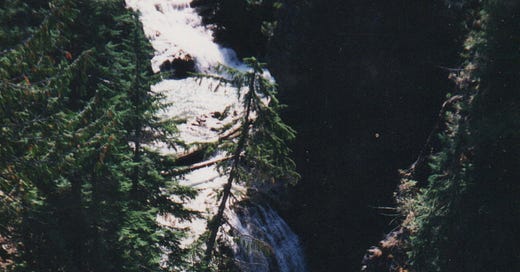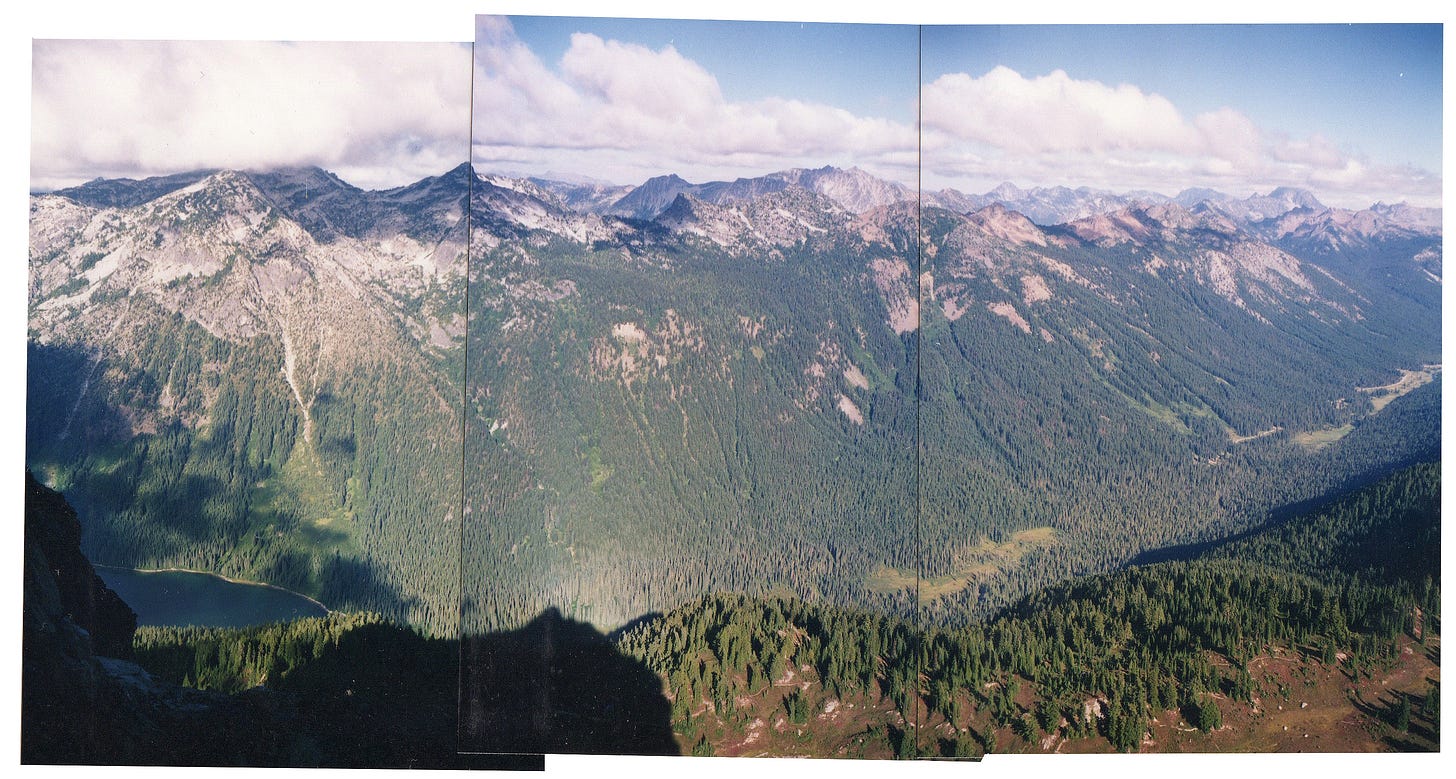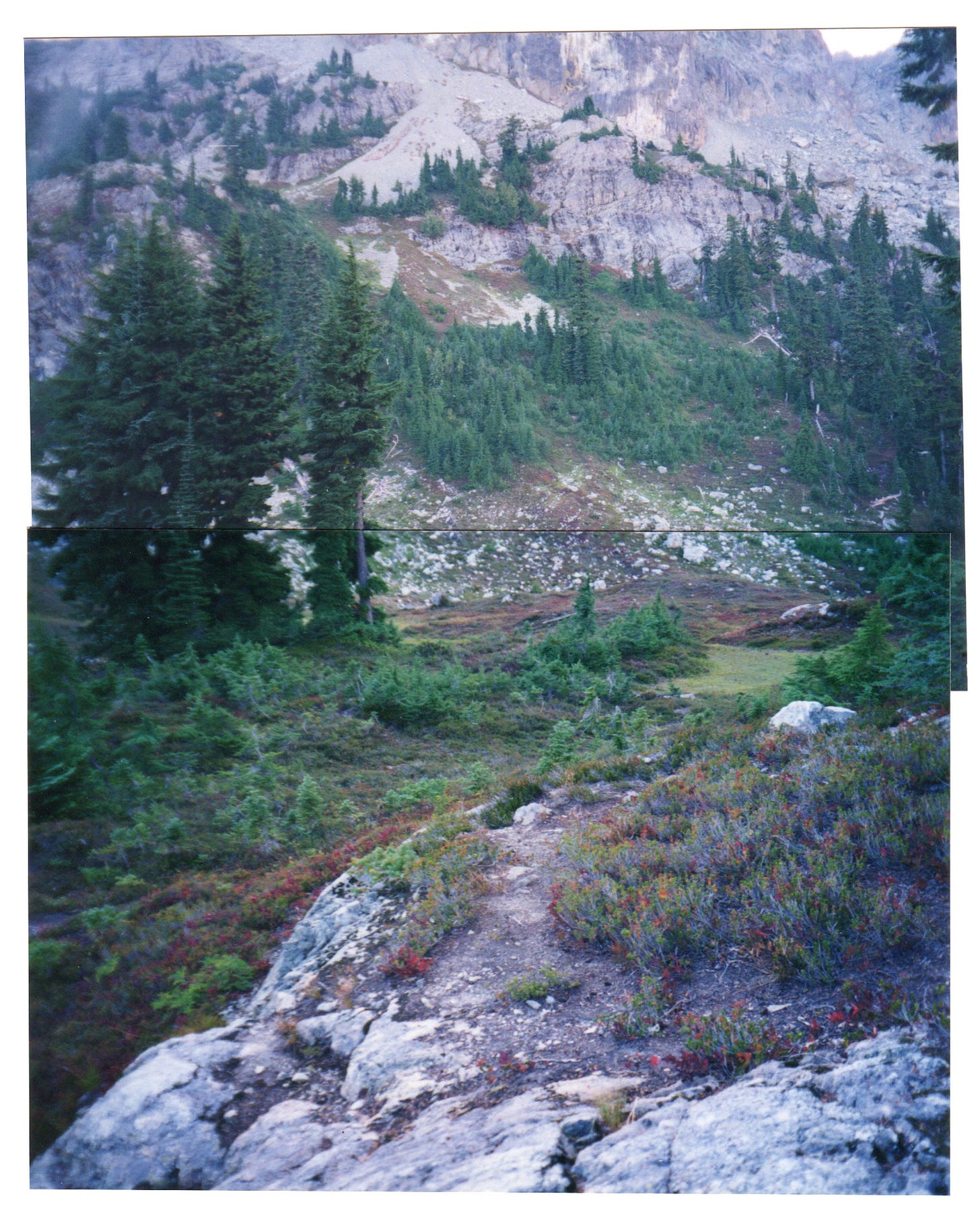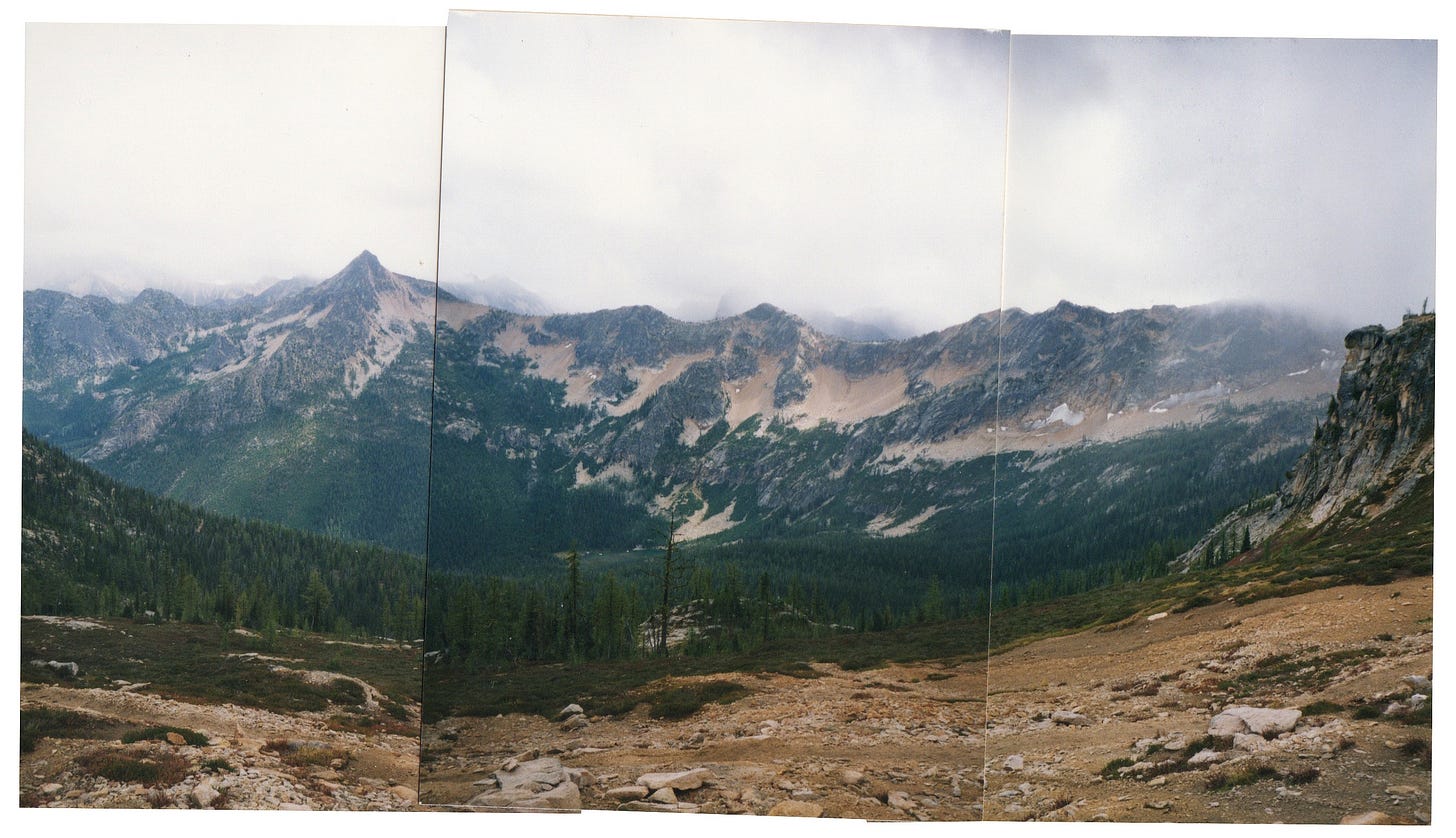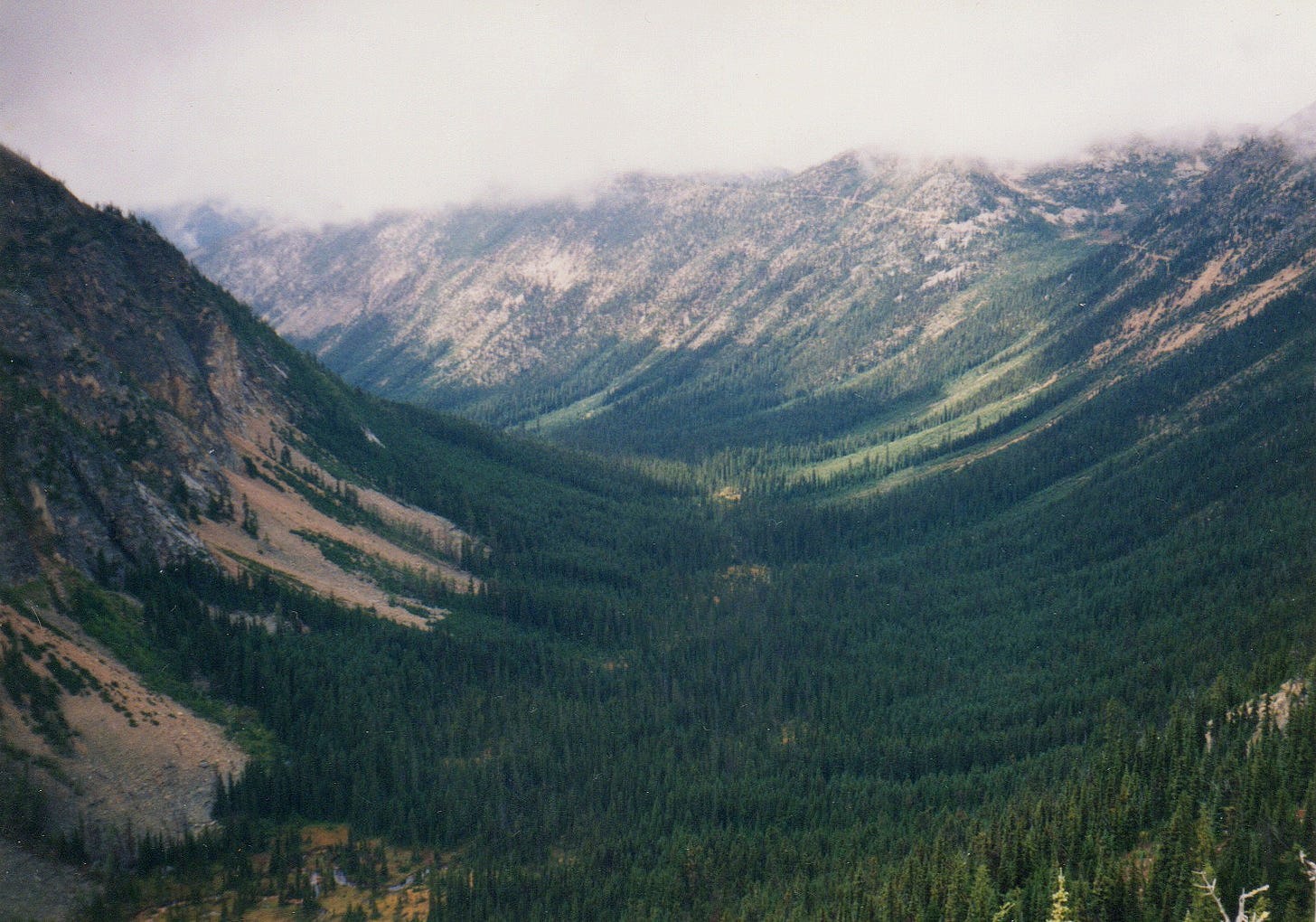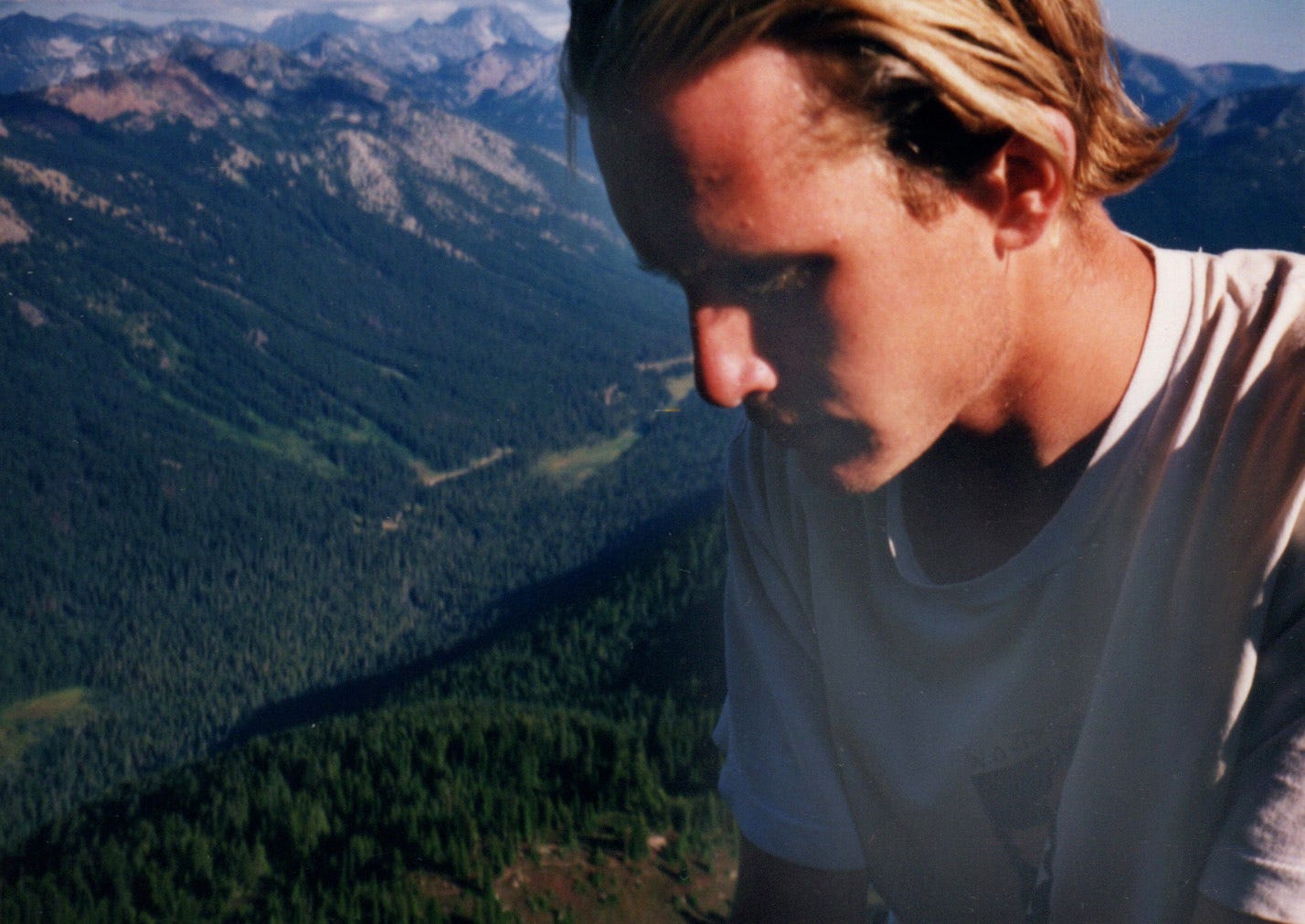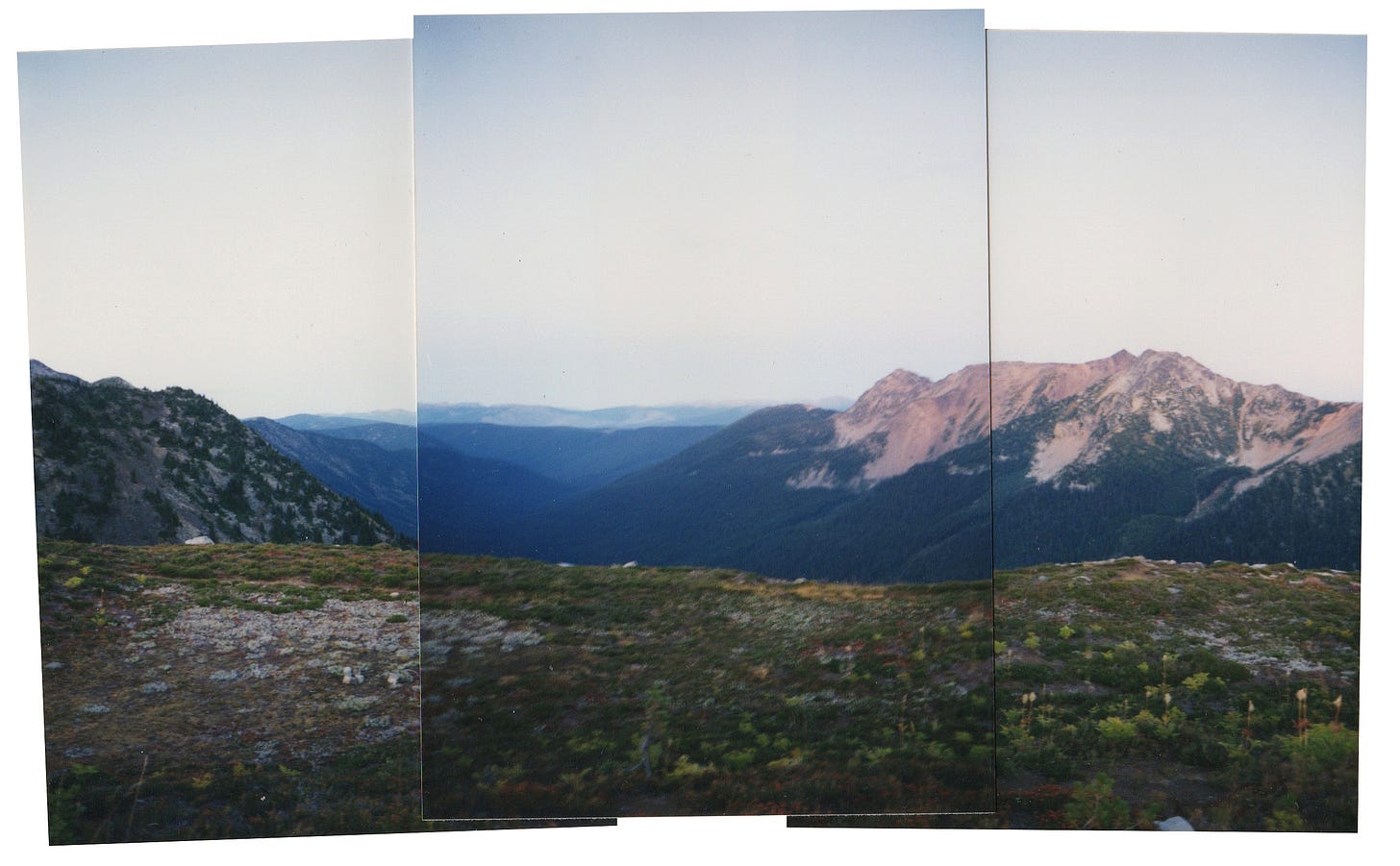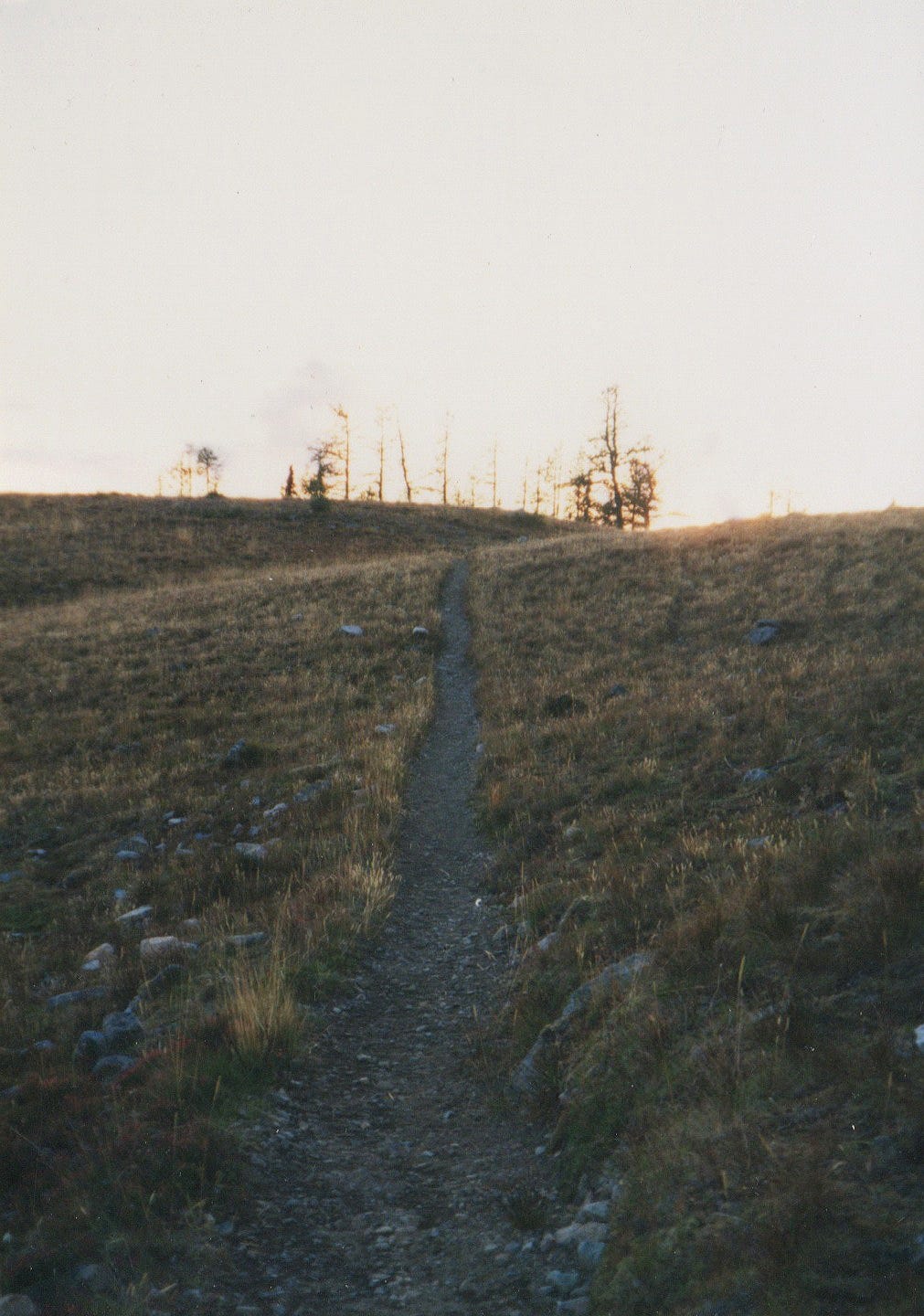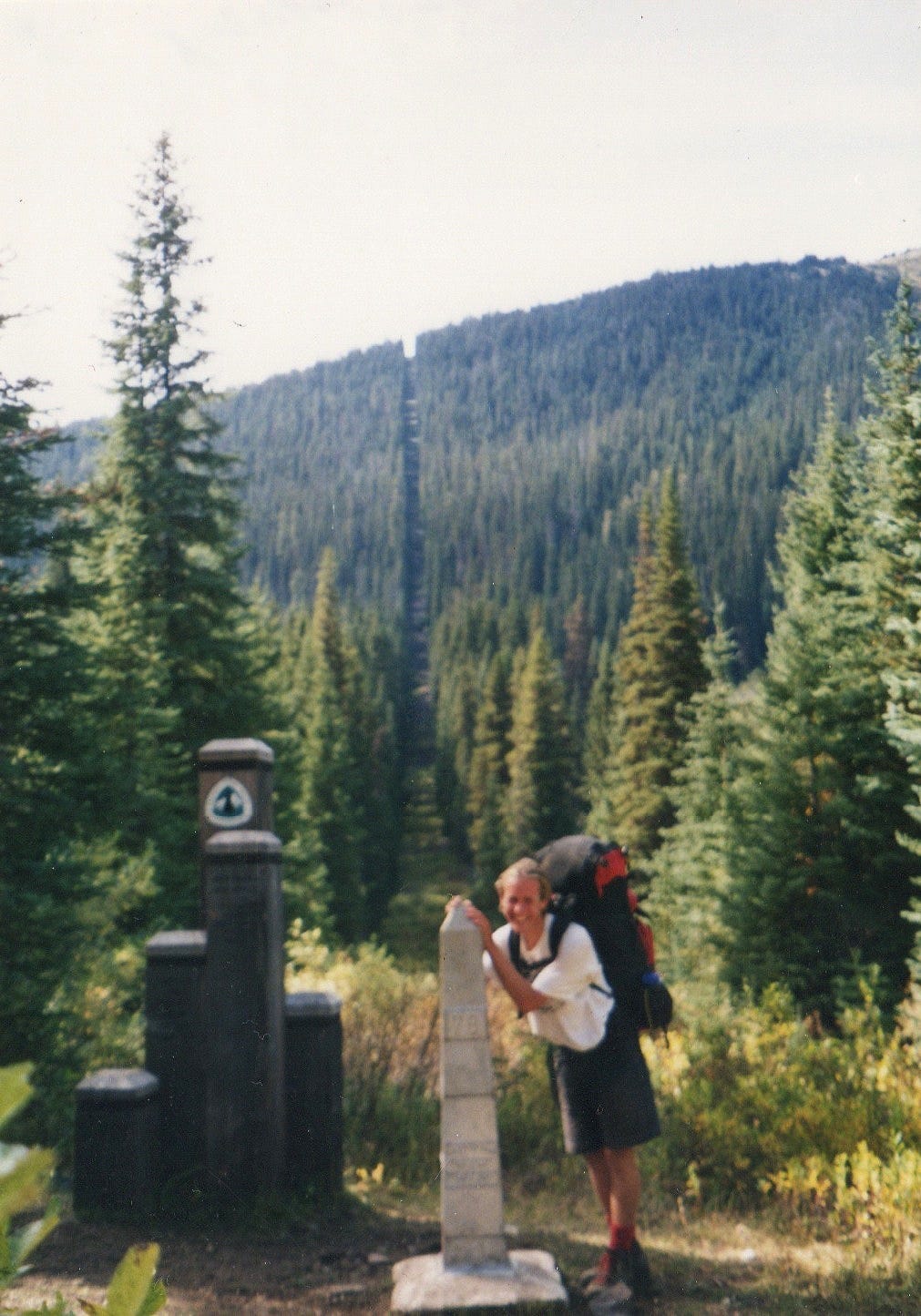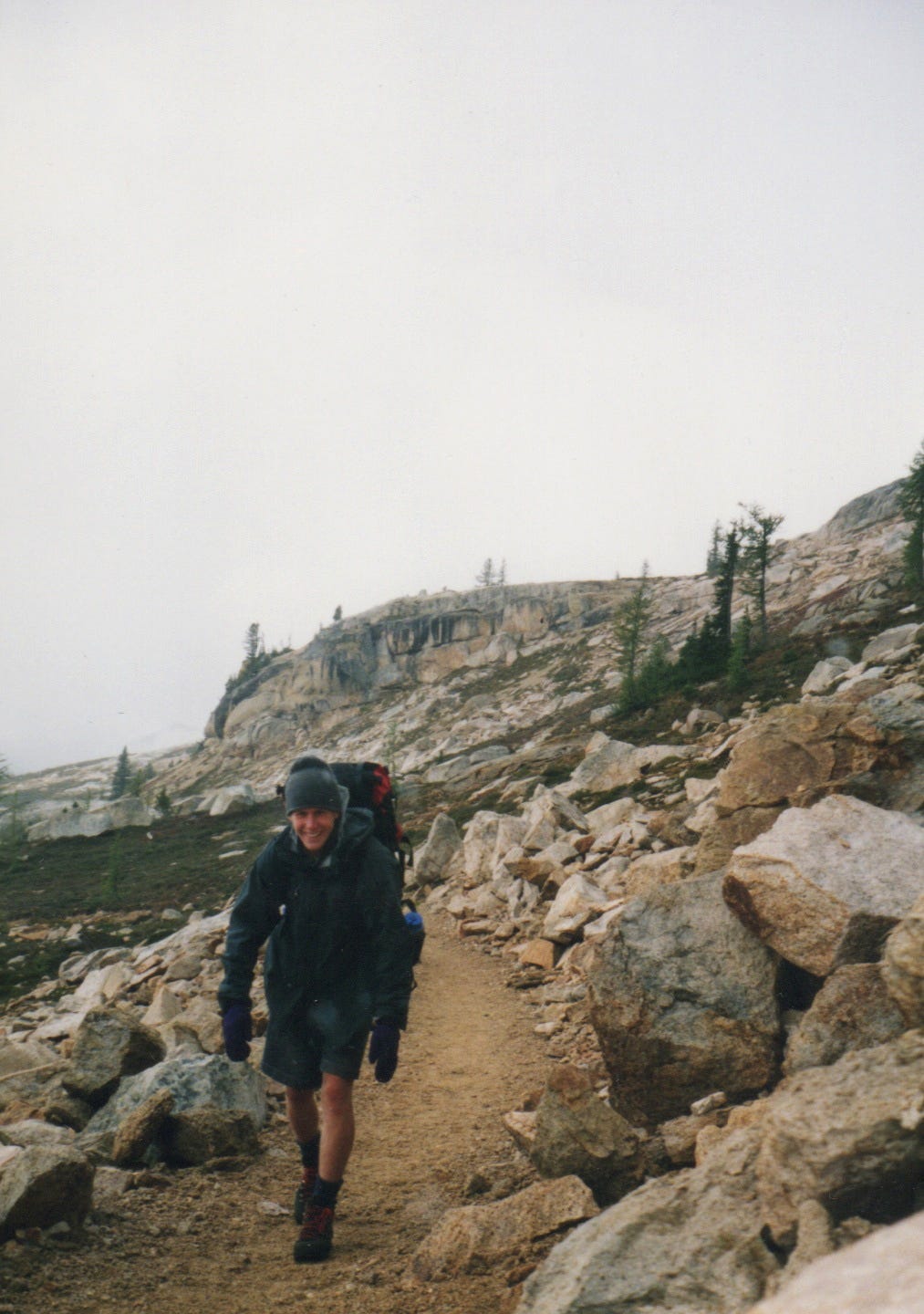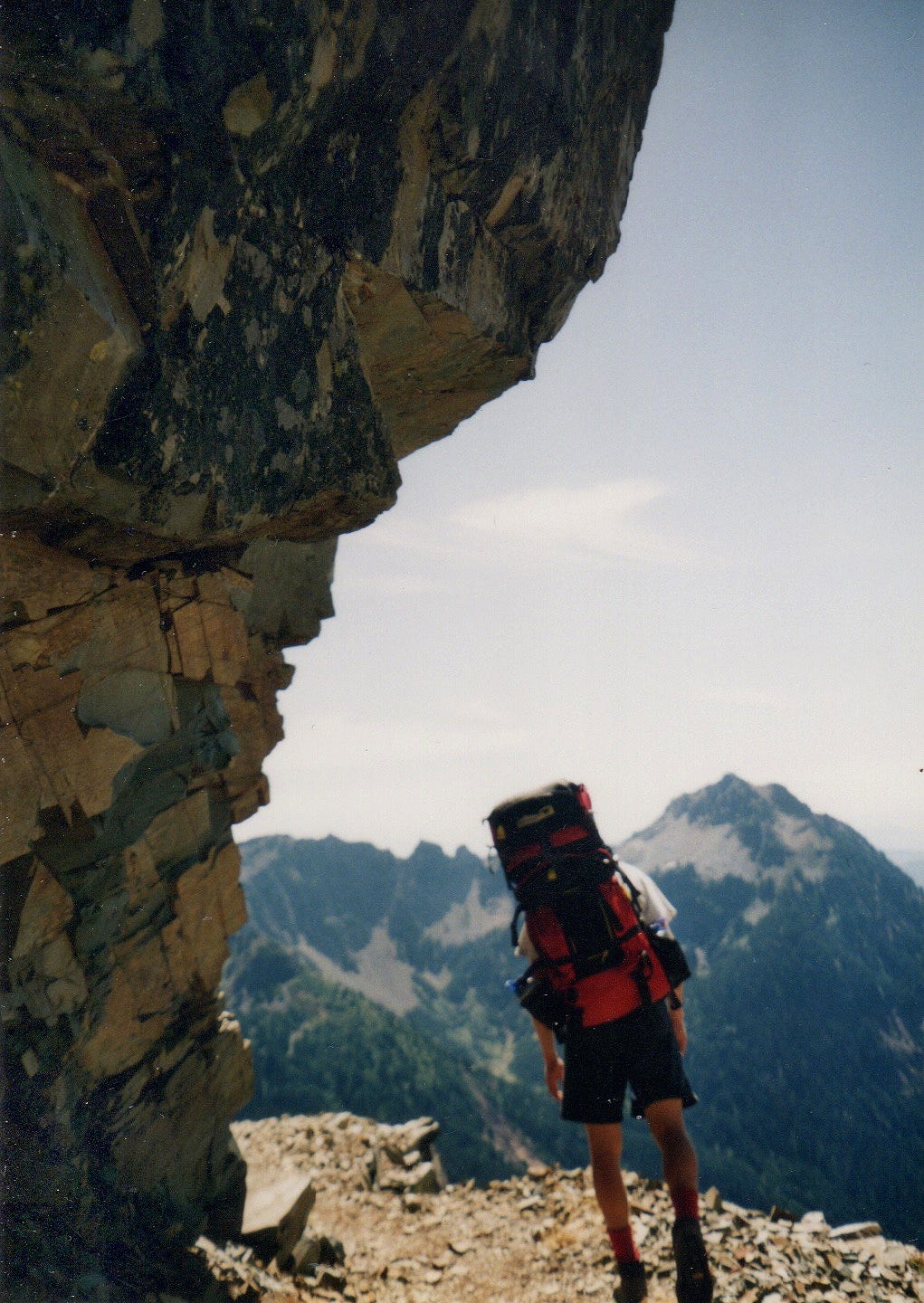This is Part 4 of The Tread of My Soul, a travelogue/memoir I wrote in 1994. Read: Part 1, Part 2, Part 3, Part 4. Or find the eBook at Apple Books or Amazon Kindle Store.
Day 24.
Hiked fourteen miles.
Saw four people.
Took a nap in the sun.
Continued the refreshing habit of sponge bathing.
Terrain seemed like a pocket from the British Isles:
Moss and car sized rocks strewn all about the ridge.
Camped at Pear Lake which is probably the most beautiful I've come to.
Dark aquamarine waters backed by steep lime-green mossy slopes and granite cliffs.
Whenever I am on the edge of a cliff, I think about falling. I'm not particularly acrophobic, but for one reason or another I imagine myself plummeting. I wonder: is this uncommon?
When I was little, I imagined that if a jumped off a cliff with a running leap I would probably fly at least fifty or so feet out, horizontally, before meeting the ground. When I discovered this was not true, it came as a surprise: like when you compare different shapes of jars at the grocery store to find that they hold the same amount of liquid.
The river canyon wall is about 250 feet tall. Looking past columnar jointed rocks, I see a stand of the trees, oversize parasols, crowding the shore walls. The water churns, cascading into white chaos before reclaiming its surface tension the pool. It’s as if someone emptied an enormous lime Kool-Aid packet into the water. The pool is a gradient of emerald to green-black. A handful of stripped and battered logs are clustered in a snag.
I eat lunch there and I think what is it that really keeps me from leaping down? Why do I want to exist? Is it because I am socially knit into so many other lives, primarily the lives of my family? My responsibilities as a son, brother, and friend? My roles? Or is it my future? Is it all that awaits me that keeps me from leaping? Father, Husband, Artist? Or is it that if I choose not to jump, I could enjoy life that much longer? A simple, sensory pleasure? A string of them? A snowflake on my tongue? Dawn illuminating the white slopes of Glacier Peak while I sip from peppermint tea? A shooting star?
Why?
I’m intended? Or is it survival instinct only?
Why?
I went for him, shook him by the shoulders with nothing to shout at him but "Why, why?"
He answered me gravely. "It’s true but you must begin to think how."
- René Daumal, Mount Analogue
Perhaps I have been conditioned to think that the question always precedes the answer.
Do you suppose time began as a question or an answer? This question is itself nonsensical. Similarly, asking why I exist, why do I choose to sustain my life is nonsense. One’s very existence is the answer preceding the question.
You begin with "I am." And even if you did begin with "I am?” your first breath would silence that: "Yes, you are." The whole world is filled with acknowledgment: animals, plants, minerals all say, "You are."
The question follows: Now that I am, how shall I be? It seems to me that this is the purpose of imagination.
Imagination is more important than knowledge.
- Albert Einstein
The world exists. I exist. This is knowledge. How does the world exist? How shall I exist? Perhaps, just as my imagination can conceive my plummeting body, it can simultaneously conceive oceans of things that keep me alive. I can imagine the pain it would cause my family, and the pain it would cause me.
In the imaginations of humankind there are a multiplicity of ways to imagine the world came to be. The Creation theory and the Big Bang theory are popular. I side with Einstein here and say it is important, for many reasons, to imagine both.
How shall I exist? How do I want to exist? How can I exist? How have people existed before me? Buddha, Jesus, Muhammad, Lao Tzu, Moses, Gandhi, Martin Luther King, and all sorts of people who write books, tell us ways to live, ways people have lived. Again imagination seems more important than knowledge. We can learn from all.
Without imagination, respect and compassion are both impossible. Without respect and compassion, the most beautiful and simple idea will remain only a precept and not a practice:
Love your neighbor as yourself. (Exodus 19:18)
See yourself in others.
Then whom can you hurt?
What harm can you do? (Dhammapada, Sayings of the Buddha)
On the edge of I cliff I eat lunch. I bask in it all.
• • •
Day 25.
Hiked thirteen miles.
Reached Glacier Peak at dusk.
Rain, rain, rain.
Camped with Erika and discussed Gaia and the molecular properties of water and other things.
Any journey is an illuminating metaphor for life.
I must choose how far to walk each day. Fifteen miles serves me well. I reach my goal efficiently, yet I won't be too tired to enjoy it. I stop where the landscape arrests my senses, not when my stamina gives out. I stop and observe my corner of the universe. I admire the creatures: the frisky and spry Yellow Pine Chipmunks. I admire the atmosphere: the elusive mist and enigmatic wind.
I do not want to accomplish more than I can enjoy. I met some PCT through-hikers that started in Mexico recently. They travel 25-30 miles a day now. Do you know why? They said they were “burned out”. They just want to finish and go home. Check it off the list.
Personally, I don’t think I can enjoy that rate of travel. Others may be able to with ease. In my travels I try to emphasize journey over destination.
If you have the time, hiking to Canada may be even more agreeable than flying or driving. What do you suppose you can really see from inside those boxes?
In a car you're always in a compartment, and because you're used to it you don’t realize that through the car window everything you see is just more TV. You're a passive observer and everything is moving by you boringly in a frame."
- Robert Pirsig, Zen and the Art of Motorcycle Maintenance
I am not content to continually place myself in a capsule to get from here to there. Life is a journey, not a destination.
Does water have a destination? Here are your choices: Precipitation, transpiration, and evaporation... All the water on this earth is in motion. Water is on a endless cyclical pilgrimage. The lake you see is not the same lake you saw an instant ago. Yet the wide-angle view is placid.
If I go at a human speed, I will not undertake more than I can accomplish. I will not accomplish more than I can enjoy.
• • •
Day 26.
Hiked seventeen miles.
More rain, rain, rain.
“Valley of the Shadow of Death.”
Many people to be seen here in the beautiful White Chuck River canyon.
Camped at hot spring.
Steve gave me food.
You cannot distance religion from living. It is ubiquitous. It soaks into the fabric of human relationships. Some will say it intensifies and illuminates. Others will say it stains. I say both.
I would reveal my doubts to Young Life colleagues. They meant well by saying they’d pray for me. But really, it made it sound as if I were just sick—that prayer would cure me. I felt stained.
I am on this trip alone. I have received letters on the trail, many of them containing a prayer for me: "Chad, I pray for you—that you are safe and well." I am truly grateful for these prayers.
I am surrounded with beautiful people who claim Christ as their savior. Beautiful people who pray my name to God. Would it disappoint them if I said I couldn’t authentically love the Lord God with all my mind as it is commanded of me in the Bible? I cannot put faith in Jesus as my savior without the consent of my intellect.
Will they fear for my soul? Will my presence be uncomfortable during a prayer or religious rite? There is a hymn I know with the chorus, "I’m so glad I’m a part of the family of God." I liked that hymn. Must I no longer sing it? Will they stop signing their letters, Love in Christ?
Am I The Prodigal Son?
Why must religion permeate? It is a private affair, God and I.
That’s me in the comer.
That's me in the spotlight.
Losing my religion.
- Michael Stipe, “Losing My Religion”
• • •
Day 27.
Hiked eleven miles.
Morning soak in the hot spring.
Talked with a young psychologist called Frank.
Walked uphill, uphill, uphill…
Not very far.
At dusk I was joined by a chatty and amiable family, The Murphys, which was nice.
Stehekin, Washington: I read letters and reply, realizing apart from my father, only one friend sent letters to each resupply point: Megan. Ours is an honest correspondence, and I think this is the only reason it endures.
Her faith in Jesus glows. It makes her attractive as a person. She also has the ability to think critically and articulate herself well.
There is a simple model my sister explained to me once that illustrates what a good Christian relationship looks like. It is a triangle. At the top we see God. At the base we see two people with a relationship. So it goes: As we grow closer to God, we grow closer to each other.
It follows that in a monogamous relationship marriage is simply the pinnacle of the triangle, or close to it. God manifest. God ordained.
My relationship with Megan is dissimilar:
I am not growing toward God but I feel I am nevertheless rising. Neither am I cutting a straight swath to her or diving at an acute angle to meet her. Rather, it was as if my side came unhinged and beginning to travel like a sonar screen. From this illustration I dare to conclude the following:
• I am still growing.
• I’m not growing toward a conventional God.
• I am familiar with that skew though (toward God).
• My process isn’t linear, rather circular.
• A complete circle would bring me back to God?
We speak thoughtfully to each other, often describing the events in our lives we cherish (often similar). She tells me about her garden—the transformation from life to death, the withered red skin of a tomato. She always makes some prayer at the end. She signs, Love in Jesus.
I tell her about my art. About hiking and the wilderness. I always digress into philosophy and religion. I ask her difficult questions. I always sign, Yours.
Because I am not following my sister’s diagram I make candid remarks to Megan like, "You would make a good wife; faithful, strong... Take my boldness as a compliment.”
Such is the respect. Such is the honesty. I want to understand her, she wants to understand me.
You can never understand someone enough.
People are not like places—you cannot map them. People change faster than a river valley, a ridge, or road. They’ll change, rendering your cognitive map outdated.
Love.
You can love where you can't understand. Love is malleable. People change and your love will allow them.
• • •
Day 28.
Hiked twenty-four miles.
Mostly hiking; no writing.
Two big passes.
Three people from Mexico passed me.
Camped on a precipice.
Didn’t set up the tent.
The sky was stitched with stars. I watched in wonder.
I could describe this valley to you. I could describe how that mountain looks like a bride, a veil of mist and a resplendent green gown. I could describe this stream running over the entire surface of this rock table. How that grass shakes down there. How the cliffs are elephant purple; the talus slope is an earthy orange; the trees, avocado green; the meadow, pencil yellow. I could describe the acrid fragrance of the soil, and cooling wind on my face. I could.
But in the end no matter how vivid the descriptions may be, you are not here. Mine is an interpretation, seen through my own lens.
Landscape painting is easy. Mistakes of proportion are harder to detect than in, say, a portrait. If you make a line too long or a green too blue, who is going to say it's not right? It’s ironic that we can be so free in our interpretation of nature—the supreme gift of God—but we are often admonished for interpreting scripture freely—another gift of God. I am amazed at how divisive interpreting scripture is. In Portland, where I live, there are sixteen different denominated headings of Baptists alone in the Yellow Pages. I suppose that each of these sixteen think their doctrine is superior enough in some way or another to warrant the distinction. It surprises me how splintered Christianity is. Hinduism: phenomenally more so. The sects and denominations that have diverged from Hinduism over time are countless.
So where do I fit in? Shall I leave religion alone—leave it splitting in its own confused dust clouds?
There was a toy I had as a child: a blue and red hollow polygon that pulled apart to dump out its yellow plastic contents. On each surface was a shaped hole, corresponding to a plastic block. The learning came from associating the shape of the block to the shapes of the holes.
My mind is like this toy. Like a neurotransmitter finding its node, or a star shining through a hole in the clouds, or a child putting a circular shaped block into a circular shaped hole, I happen upon a word, a phrase, a paragraph that fits me. How can I expect it to fit you? Aren’t we all unique?
I consider the scriptures, the words of poets, authors and saints, and continually I find the form of someone else's words corresponding with the form of my thoughts and so I seize them to fill myself. Far be it from me to stuff words into your mind--they may not fit. They will not fill you. Moreover, we truly learn by doing it ourselves: When I was a kid trying to stuff a triangular shaped block into a circular hole I was learning. Don’t criticize a child for trying to stuff a triangular shaped block into a circular shaped hole. One need only teach by encouragement. One need only help if the child gives up.
Let the little children come to me, and do not hinder them, for the kingdom of God belongs to such as these.
I tell you the truth, anyone who will not receive the kingdom like a little child will never enter it.
- Jesus, Mark 10:14,15
If I had to start a church, perhaps I would call it The Church for the Eternal Children.
• • •
Day 29.
Hiked eighteen miles, mostly alongside a creek.
Ate lunch above the gorge. Sunny.
Talked to Dylan-who-is-four while waiting for the bus to Stehekin.
Funny redhead little thing.
Apple pie.
Shower.
Hit the sack.
God.
Lots of people think life wouldn't have any meaning without God. And yet it is arguably death that wouldn't have any meaning without God. Life? Life goes on for the most part without God here. If God were to stop existing, would anyone notice? If God were to send all His Angels on vacation, would anyone notice? Bad things happen to good people.
Perhaps we could think of God as in the abstract as simply all matter and stop anthropomorphizing him? Would that be good? I don’t think so. In the first place we already have words to serve that purpose: cosmos, universe... Secondly, God is our heritage. Even if you are an atheist, someone in your lineage was likely a deist. Thus, God is a part of your family tree.
I’m fine with our coins proclaiming, "In God we trust.” Those who would have it eliminated may as well petition to eliminate money altogether. Why stop at one symbol (God) when you could go for two (God and money).
Perhaps God is everything except what we can know and learn. Perhaps lifting the veil of death and crossing over into the beyond would unite us with the unknowable. Life, on the other hand, as far as I can tell has little to do with God. Better to consider the tangible.
God is what you devise. God is what you use.
Is it possible that there are people who say “God” and think it is something they have in common? —Take a couple of school boys: one buys a pocket knife and the same day his friend buys one exactly like it. After a week they compare knives, and it turns out that there is now just a very distant resemblance between them—so differently they have developed in different hands. ("Oh,” says the mother of one, "you can’t own anything without wearing it out in a day...") In the same way: Is it possible to believe we could have a God without using him?
- Rainer Maria Rilke, The Notebooks of Malte Laurids Brigge
• • •
Day 30.
Hiked zero miles.
Wrote letters by water on Lake Chelan.
Talked to Sheila, and shared my pier with her. She said she was an “oldie and boldie”.
I soon understood.
Wrote letters,
Phoned home.
If everything on earth were rational, nothing would happen.
- Dostoyevsky, The Brothers Karamazov
Why should we have to pray if God is all knowing? He knows what is going to be said anyway, correct? Perhaps there is something to be gained in the act itself, a petition of humility.
There are these votive statuettes of antiquity from Tell Asmar, now modern Iraq. They were carved in limestone 4700 years ago. They stand erect with hands clasped tight, drawn against their chest in an attitude of prayer. They are so human. Their eyes are large and reverent. They were thought to offer unceasing prayers on behalf of their donors; their eyes a symbol of the eternal wakefulness necessitated to fulfill their duty.
In the spiritual classic, The Way of the Pilgrim, the Russian peasant discovers the method of praying unceasingly: He chants with each breath, “God have mercy on me, I am a sinner.” He says this over and over and over again until it is internalized, seemingly, as a biological rhythm. In the narrative he is overwhelmed with peace and the world is continually bountiful.
For the agnostic and doubtful among us, perhaps it is easier to adopt an attitude of prayer rather than shorthand phrases of petitioning and praise. My prayers form themselves out of humming and playing guitar quietly and simply, sometimes intoning a word like Aueluiah. Only in this way do I remain earnest.
To some of us the thought of God is like a sort of quiet music playing in the background of the mind.
- William James
Humble knowledge of ourselves is a surer way to God than is the search for depth of learning.
- Thomas a Kempis
"Praise our God, O peoples, let the sound of his praise be heard."
- Psalm 66:8
• • •
Day 31.
Stayed in Stehekin.
Milled around village.
Rested.
Wrote in this book.
[At this point in my journal the entries discontinue and fall to scribbles, notes and the like. From them, I care to only write three more entries here in reflection. As such, this editorial note will have to serve as the entry for Day 32.]
• • •
Day 32.
Hiked out of Stehekin.
Lost in thought, made wrong turn.
Steve, however set me straight.
Ate lunch and wrote above a small waterfall.
The only container I have for my soul is this body. I turn north. I isolate my body that I might know my soul.
We are all keen enough to understand our condition. We know this: we will die. We die because our body fails us. I do not think we can know what exactly becomes of our souls after death, but we all tend to have some fundamental intuition that our essence rejoins the essential.
Heaven or hell or reincarnation or conservation of mass and energy… All we have for now is a body with which to understand and express soul.
I have said that the soul is not more than body,
And I have said that the body is not more than soul.
- Walt Whitman, Song of Myself
I turn north because it is all I understand and everything I don’t understand. Little has changed. I am not enlightened nor can I honestly hope to be. Perhaps the most authentic enlightenment is submission.
Wisdom... is knowing what you have to accept.
- Wallace Stegner, Angle of Repose
I have no spectacular creed to share. I know only the relatively shallow depth of my own life. What hope does life have? I continue to live because it is a sublime gift. Because for some reason I can.
Because even in the desert, where there is nothing, there is you and there is dust and…
You hardly know whether to laugh or to weep. Weil, laugh then, since you have to choose one or the other. Laugh... with the knowledge that there may yet be hope not just beyond the dust of our world but within the dust.
-Frederick Buechner, A Room Called Remember
Where is God?
Whatever you did for the least of these brothers of mine, you did for me. (Jesus, Matthew 25:40)
God is here.
I see something of God each hour of the
Twenty-four, and each moment then,
In the faces of men and women I see
God, and in my own face in the glass;
I find letters from God dropped in the
Street, and everyone is signed by God’s name
And I leave them where they are,
For I know that others will punctually come forever and ever.
- Walt Whitman, Song of Myself
Where am I?
...wait without hope
For hope would be hope of the wrong thing; wait without love
For love would be love of the wrong thing; there is yet faith
But the faith and the love and the hope are all in the waiting.
Wait without thought, for you are not ready for thought: So the darkness shall be light, and the stillness the dancing.
- T. S. Elliot
I turn north into the darkness. I see the stars against the arc of night, of which I know little, and yet I am made of the very same stuff.
• • •
Day 33.
Hiked eighteen miles in mist.
A man who walked the entire trail last year had presents for us: juice and a granola bar.
A German man was touring on his bicycle. He said simply,
"Do you need anything?"
Entered The North Cascades.
So beautiful: The contour and space of glacial valleys.
The last miles to Canada are lush. The trail descends through thick, verdant canopy and is several times infiltrated by a tributary stream cutting across the trail. Finally, at the bottom, as if I have come to rest in a topographic bowl, I reach the border. It is very plain to see: a twenty-foot swath of trees cut down running from the mountain on my left to me to the mountains on my right. Where the swath and the trail converge, there is a marker. It’s a four-foot cast replica of the Washington Monument with the number 78 stuck prominently on one side. Here, I guess that the number has something to do with the longitude, but I am not entirely sure.
I notice the corner of a Ziploc bag creeping out the of the groove, where the tower meets its base. I discover it is one of five: one for each year from 1990 to 1994. The contents are an array of notes that through-hikers left upon completion of the trail. I read all the notes from this year: They speak of where they started and often when. Some were boring; comments on clear-cuts and weather were common. The promoters behind the Pacific Clear-cut Traverse Sticker, and the Lorax Leaflet identified themselves. One man left a gospel tract and some note remarking about the glory of His obvious creation. My contribution was a torn Creamette pasta box with this message scrawled on the back in pencil:
Greetings, You.
Chad Crouch completes state of Washington.
“I wanted to live deep and suck out all the marrow of life, to live sturdily and Spartan like, to cut a broad swath and shave close.” - Henry David Thoreau, Walden
I suppose it is apt I finish here. Where? Canada or the States?
Neither, friend. A broad swath, a nowhere running to each horizon and cradling me here. Deliberation is a process without end.
Destination. The sheer meaninglessness of the symbol 78 imposed on the through hiker at the end is good; a gentle reminder to find meaning in the perennial destination: oneself. Call it your soul.
“Just Keep in mind...that your dialogue with nature was just the outward image of an inner dialogue with yourself.” - René Daumal, Mount Analogue
• • •
Day 34.
Hiked eighteen miles.
Walked across abandoned trail on talus slope.
A spring seemed to come right out of the top of that rock.
Near sunset I found Mash, a man about my age who Karl had walked with the week prior to my meeting him.
The circle of friends was made complete on the last night of my walk.
We were inspired.
You don’t finish the PCT at the border. There are eight more miles to go to Canadian Highway One and Manning Provincial Park Lodge.
I walk seven reflectively and see no one. When I come to where the trail meets a dirt road I see a man slightly bent over, studying a posted trail map.
(Eastern European accent) “Do you hof some time, perhaps, to share with me about this trail?”
I must have looked perplexed when I offered my answer. “Um, well, of course.” I think: He can’t be going in.
I look at him. He has a foot-long beard that comes to a point. His eyes are azure blue. He wears a tattered, lined wool shirt, a stocking cap, jaded pants, and cheap tennis shoes. He carries only a black garbage bag. When he lays it down it sinks into itself to reveal how little it contains.
“I am just looking at this mop. Tell me, how far must one go to get mon-made food?” His eyes pierce me with sincerity. He moves his hands graciously when he talks.
I am struck by the seemingly naive question. “It’s a really long way.” I calculate. “Ninety miles,” I say.
"Tell me, are there berries?" He pinches his fingers together as if to mime plucking berries.
I tell him I saw some about ten miles in, but sparse. Hard to make a meal of it.
He tells me his name is Karel. I ask him to spell it for me. He says he has come from the Arctic Ocean— Barrow, Alaska. Some time before that he was near the Mexican border, reluctant to go into Mexico during the winter for fear of not being admitted back into the States. He started hitchhiking when it began to get cold in Barrow. That brought him to Hope, B.C. about an hour away from the trailhead. Somehow or other he heard about the trail there and decided to make his way into America by this route rather than freight train. He opens the bag and shows me his belongings: one more wool shirt, gloves, a tourist map of northern Washington and British Columbia, a paperback Bible with the cover missing, and what looked like the provisions for an overnighter.
I warn him it’s cold, and far.
He looks at me, “I believe there are people here,” he pans his hand in the direction of the forest, "who will come when you need help.” He offers, “If I feel it is too hard, I will go to Hope, then to Vancouver where I can take a train.”
I give him what little food I have left. He doesn’t take my tea because he says, “Tea is everywhere,” as he looks around at the trees and shrubs. He accepts the food, asking if I was sure I could give it to him. Lastly, he admits he needs “fot”.
“What?” I say.
“Fot.” He mimes pinching his stomach. “Fot.”
“Oh, fat,” I say.
He says he believes peanut butter is best of man-made inventions, for its fat content.
I feel pity and concern for him. He seems so small in the face of the landscape.
He tells me he believes centuries ago the trail ran from the Arctic to Tierra del Fuego. I realize his story is a testament to the belief in such a migration.
The nights in the North Cascades have been really cold. Even in shelter, in my down bag, wearing fleece and wool I was cold, always waking up to a frozen water bottle.
I tell him how cold it’s been. He says he’ll make a fire. I give him only my food and a map. So little.
For this he calls me an angel. He says he believes in angels and that he believes I am an angel for him. He assures me of it when we part. He bends and bows, expressing his thankfulness.
“Thank God for you!” he says. “You are an angel for me!” he says.
I walk no more than thirty paces before I well up. Thirty more and I am crying. I am wrenched. This man’s faith in God seems almost to physically sustain him. I stop walking. I let go. I let it out, crying, heaving, moaning, and sobbing. Who was this brave and beautiful man, so poor that he depends on the riches of such an austere world? Who am I to walk 500 miles to meet him? How can he call me an angel? I am so much less.
• • •
Day 35.
Hiked eighteen miles into Canada.
Met Karel.
Finished.
And began.

